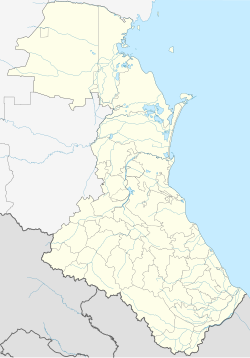Khanzhalkala
Khandzhelkala
Ханджал-Кала | |
|---|---|
| Coordinates: 41°42′N 48°19′E / 41.700°N 48.317°E | |
| Country | Russia |
| Region | Republic of Dagestan |
| District | Magaramkentsky District |
| Population | |
| • Total | 0 |
Khandzhelkala (Khandzhel-kala), it's also known as Khanjal-kala (Template:Lang-ru; Template:Lang-jdt) - abandoned Lezgins aul in the Magaramkentsky District of Dagestan. In translation from Judeo-Tat means "fortress of the dagger"[1], protected not only by the steep slopes of the mountain on which it was located, but also by the fortress walls.[2] [3]
Etymology
"Khandzhelkala" is a proper name.
Geography
The village is located in the foothills of the Magaramkentsky District.
History
In the 18th century, Khan of Derbent and Quba Fatali Khan created a separate Kura Khanate on the territory of Kura[4], but soon it was included in the Gazikumukh Khanate. Apparently, the Mountain Jews population in the Kura villages Mamrach (Mamrash), Juhuro-Arag appeared only after 1812, when they were invited there to settle by the Kura ruler Aslan Khan. Later, part of the Mountain Jews from Mamrach moved to the village of Khandzhelkala.[5][2]
In the first half of the 20th century, Mountain Jews from Khandzhelkala gradually moved to Derbent. By the end of the 1950s of the 20th century, there were no more Mountain Jews left either in the Kurakhsky or in the Tabasaransky villages. The Mountain Jews cemeteries have been preserved.[2]
References
Citations
- ^ STMEGI|Mountain Jews From the Life of the Mountain Jewish Righteous: Rabbi Divid ben Yashagyo
- ^ a b c Igor Semenov. Mountain Jews of the Northern Caucasus and Dagestan
- ^ Hana Raphael. Mountain Jews in the mountains of Dagestan
- ^ It was located in nowadays Agulsky, Kurakhsky and Suleiman-Stalsky districts of Dagestan, Russia.
- ^ Sosunov G.S. Jewish monuments of the Eastern Caucasus. Makhachkala, 2008. Kura


